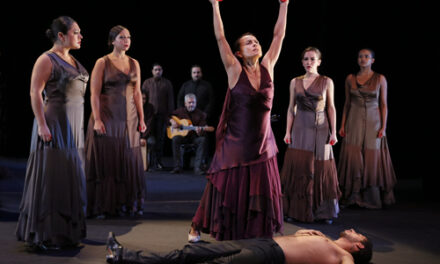RALEIGH, NC – Operas performed in a concert format are often viewed as economy productions, where the music eclipses the visual spectacle that comes with ornate sets, lavish costumes, and ready action. There was nothing bargain-basement about North Carolina Opera‘s semi-staged production of La Fanciulla del West (“The Girl of the Golden West”) Sunday afternoon at Meymandi Concert Hall. There was ample drama to move the eyes, capture the imagination and punctuate Puccini’s rich score.
Premiered in 1910 at the Metropolitan Opera, which also commissioned it, Fanciulla is not on the short list of Puccini crowd-pleasers making the rotation of the world’s opera companies for six generations and counting. Think La Boheme, Madame Butterfly, or Tosca. While well-received by global audiences, the piece met with indifference from critics and fell out of favor until the late 20th century, when Fanciulla underwent a revival. In fact, NC Opera’s performance was Fanciulla‘s first-ever in Raleigh, General Director Eric Mitchko told the audience prior to the performance.
Set in a California mining camp during the Gold Rush, the opera – for European audiences, at least – aims for “exotic” atmospherics on the same level of Butterfly‘s Nagasaki or Turandot‘s Peking. It is adapted from a story by the American playwright David Belasco with a libretto by Guelfo Civinini and Carlo Zangarini.
Act 1 takes place at The Polka Saloon. It is there that Nick tends bar and maintains order among the rowdy miners there to drink and seek the affection of the establishment’s fetching owner, Minnie. One regular there is Sheriff Jack Rance. Like all the camp men, Rance has designs on Minnie, and he’s not above brandishing his six-shooter or administering an occasional sucker punch to advance his interests. News arrives that a notorious bandit named Ramerrez is on the loose nearby, sending Rance and the other men into hair-triggered vigilance. Soon entering the Polka is Dick Johnson, a stranger from Sacramento who seems well-known to Minnie. A familiar tale of love and deception unfolds as Johnson, who is later revealed to be Ramerrez, and Rance battle for Minnie’s affection.
As Nick, tenor Scott Wichael provided a light-hearted touch amid the gravity that often pervaded the production’s mood. Wichael brought a Puccini-rich resume to Raleigh but also has sung supporting roles in Wagner and Strauss operas. Based in Kansas City, he appeared in Raleigh as Monostatos in NC Opera’s 2022 Die Zauberflöte. Wichael projected the role of Nick engagingly and with intelligence, especially while delivering some cagey advice to Millie during Act 1: “Make the rounds. Your smiles are good for business.”
Robert Stahley‘s tenor voice lent the right sound to Johnson/Ramerrez. Stahley moved easily across the limited stage space, convincingly radiating the paranoic energy of a man on the run. As bandits go, his character is surprisingly mellow and completely sympathetic, making the audience’s support all but his to lose. And Stahley lost none of it. His rich background includes work with conductor Gustavo Dudamel in Wagner’s Tristan und Isolde in Los Angeles last year. He also sang the role of Cavaradossi in Tosca at the Opera Theatre of St. Louis.
With a beefy voice and in-your-face characterization, baritone Mark Delavan gave life to Sheriff Rance. Rance may be perhaps a whisker more complicated than Baron Scarpia, Puccini’s uber-villain in Tosca – but it’s a close call. He is more in love with power than with Minnie, whose choice is made clear soon enough. Nor is Rance nearly as murderous as the bloodthirsty Scarpia. Delavan has sung both characters, as well as another operatic deplorable, Iago in Verdi’s Otello. His contemptuous sneer smeared icing on a cake whose only ingredient was pure evil. Delavan’s star power was obvious from Rance’s first lines to his last.
As what is essentially the opera’s only female character (an inconsequential household aide appears briefly), soprano Marina Costa-Jackson sparkled as Minnie, drawing light from across the building during every moment on stage. Minnie’s singular character is not without its quirks. But the audience was eager to forget all of them as Costa-Jackson provided a tonal experience that was vital. Puccini’s rich orchestration in Fanciulla concentrates at the center of the spectrum in the manner of Richard Strauss and a long list of central European Romantics. Minnie’s lines thus struck a match into the predictable darkness that fell from the combination of low, dense symphonics and an otherwise male-only cast and chorus. So the pressure was immediately on Costa-Jackson to pull the sound higher. Her response to that challenge made Minnie both visually and melodically dazzling, a testimony not just to Costa-Jackson’s talent but also her work ethic.
The cast sang well together, with Rance and Johnson taking their turns with Minnie, and the supporting characters and voices wove a thick sonic tapestry in the first and final acts. Much of the afternoon’s appeal involved watching the company’s exceptional orchestra perform on stage. Anything lost in translation to a concert format was more than offset by a fresh point of view on all that makes opera such a special art form. Returning to Raleigh to conduct was Keitaro Harada, fresh off winning the 2023 Sir Georg Solti Conducting Award. Harada set the mood early on, keeping the action on pace and creating tension as the unusual narrative moved toward resolution. The orchestra, which in this format connects to the audience with greater directness, stayed crisply tuned under Carol Chung‘s confident guidance.
The one-performance production closed out NC Opera’s 2023-24 season on a memorable note, creating excitement among Triangle operagoers about the company’s upcoming season, which kicks off November 10 with a concert performance of Verdi’s Ernani.











